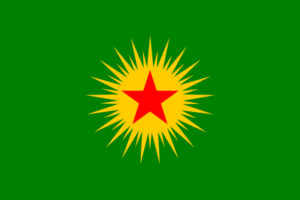
The modern Kurdish freedom movement began in the 1970s within Turkey, growing out of the student movement within the context of global youth and anti-imperialist movements post-1968. Seeing how the Turkish state kept the Kurdish region in a state of poverty, underdevelopment and disenfranchisement, Kurdish revolutionaries led by Abdullah Öcalan declared that Kurdistan was a colony and needed to be liberated. After almost a decade of clandestine organising, the Kurdistan Workers Party (PKK) was officially formed at its first congress in 1978.
The PKK utilised a range of approaches, including community organising, political education, street protest and eventually armed struggle in order to fight for the liberation of Kurdistan. The ideology of the PKK originally followed a Marxist-Leninist analysis, with the goal of the Party being to secure an independent, socialist Kurdish state.
Over the following decades, the PKK established strong networks of resistance to the brutality of the Turkish state, including guerrilla warfare from the mountains of North Kurdistan (southeastern Turkey). As the reputation and power of the PKK grew, its numbers swelled. Notably, there was a steep increase in the number of young women joining the movement in order to fight for their freedom as both Kurds and women.
The 1990s were a crucial time for the development of the PKK’s ideology. As women became increasingly organised and influential within the Party, forming autonomous congresses, lines of command and military structures, the issue of gender liberation became (with the backing of Abdullah Öcalan) increasingly central to the movement’s understanding of revolution. Furthermore, the collapse of the USSR and the revelations of just how brutal and authoritarian it had been triggered a serious re-evaluation of the Party’s aim of establishing a socialist state. Years of research, analysis and discussion, much of which was led by the women of the PKK, gave rise to an insistence on forms of radical democracy which de-centred the state. This led to the New Paradigm of the Kurdish freedom movement, based on three key pillars:
- grassroots democracy;
- women’s liberation; and
- ecology.
Following the capture of Abdullah Öcalan by Turkish intelligence agents in 1999, he consolidated the New Paradigm in texts written under harsh prison conditions. As these texts were disseminated, the PKK and the wider Kurdish freedom movement focused efforts of putting the New Paradigm into practice, both within the regions of Kurdistan and among diaspora communities and social movements worldwide.
The Koma Komalên Kurdistanê (KKK) was established in 2005 in order to form an umbrella organising body of the movement. This was replaced in 2007 by the Koma Civakên Kurdistanê (KCK), which continues to co-ordinate projects within the different regions of Kurdistan, as well as to organise the Kurdish diaspora around the world to this day.
Organized in different areas of life — economy, culture, self-defense, justice, social life, diplomacy, politics — the KCK’s mission is to support and build structures of self-administration. Through its hundreds of member organizations the KCK represents millions of people and counts tens of thousands of active members engaged in all domains of work. Its supporters and members come from all walks of life and are comprised of millions of Kurds and an ever-growing number of Arabs, Turks, Persians, Assyrians and other people. The influence of the KCK goes far beyond its immediate member organizations. Acknowledging the deep crisis the Middle East finds itself in today, the KCK has proposed the system of Democratic Confederalism as a solution for the regions problems thus inspiring parties, organizations, institutions and people all over the Middle East and beyond. As a result, the KCK entertains relations with a broad variety of political, social and cultural forces both regionally and internationally.